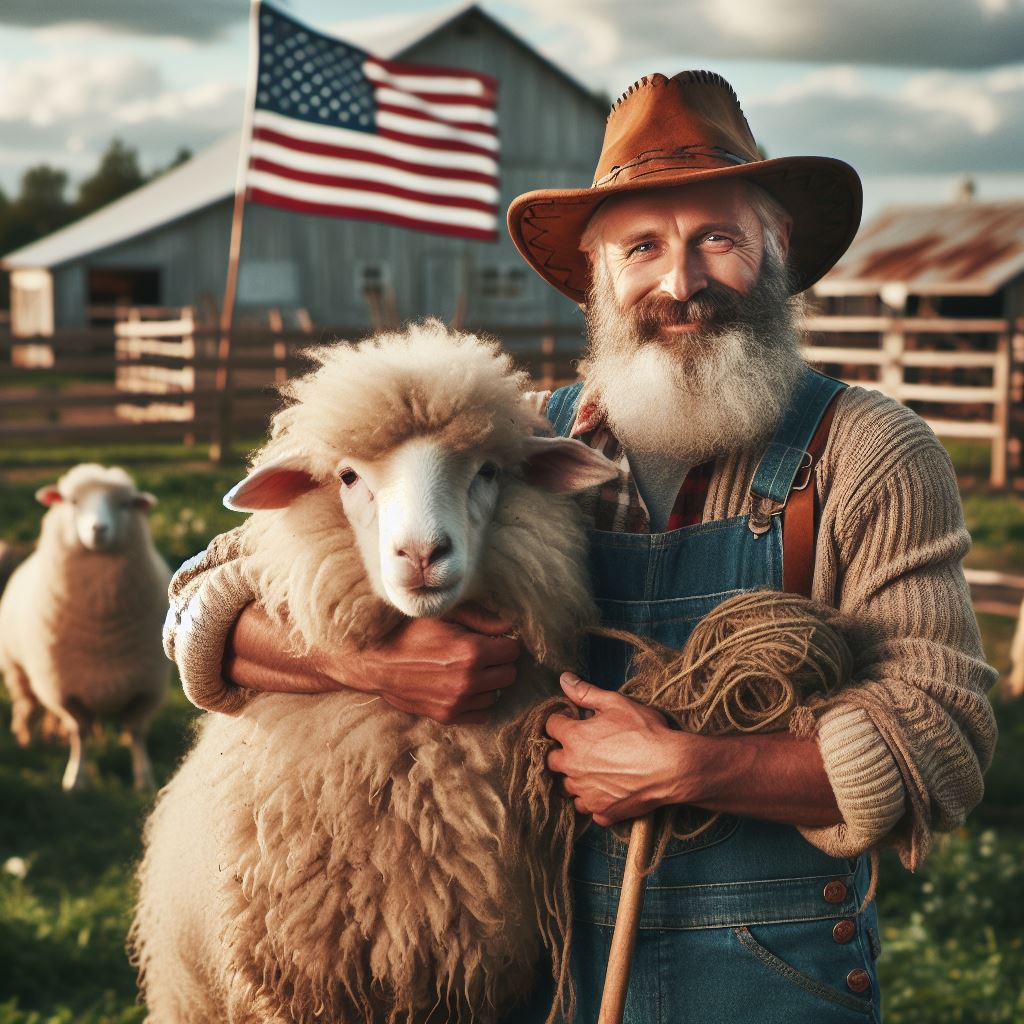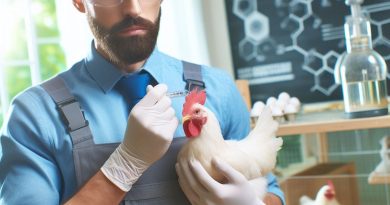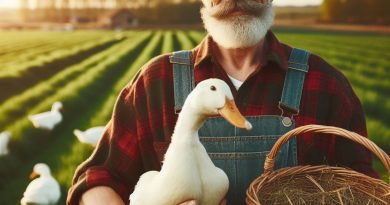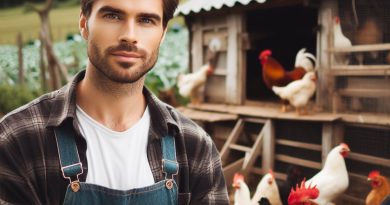Best Sheep Breeds for Small Farms in the US
Last Updated on March 2, 2024
Introduction
Importance of choosing the right sheep breed for small farms
Choosing the right sheep breed is crucial for small farms as it directly impacts their success and profitability.
Different sheep breeds have specific qualities and characteristics that make them suitable for specific farm conditions, climates, and purposes.
Making the right choice ensures good health, productivity, and ease of management.
Overview of the blog post content
In this blog post, we will provide valuable information on the best sheep breeds for small farms in the US.
We will discuss various factors that small farm owners need to consider when choosing a breed, such as the farm’s location, purpose (meat, fiber, or dairy), adaptability, and temperament.
We will analyze the characteristics of different sheep breeds and highlight the advantages and disadvantages of each.
Additionally, we will provide tips on selecting reputable breeders and resources for further research.
By the end of this post, readers will have a clear understanding of which sheep breeds will best suit their small farms, helping them make informed decisions that will contribute to the success of their operations.
Read: Sheep Breeding 101: Best Genetic Practices
Factors to consider when selecting sheep breeds for small farms
Climate and environment suitability
Consider the climate and environment of your small farm when selecting sheep breeds.
Some sheep breeds are more suitable for warm or cold climates.
Ensure that the chosen breed can tolerate the temperature, rainfall, and terrain of your region.
This will help ensure the overall health and productivity of the sheep on your farm.
Purpose of farming (meat, wool, or both)
Determine the purpose of farming before selecting sheep breeds for your small farm.
Certain breeds are primarily raised for meat production, while others are known for their excellent wool.
If you intend to focus on commercial meat production, select breeds with good meat qualities.
On the other hand, if you want to produce high-quality wool, choose breeds specifically bred for their wool production.
Alternatively, you can opt for dual-purpose breeds that excel in both meat and wool production.
Ease of handling and docility
Consider the ease of handling and docility of sheep breeds when making your selection.
Some breeds are naturally calm and easy to manage, while others may be more skittish and difficult to handle.
For small farms with limited manpower, docile breeds are often preferred as they are easier to work with.
Docile breeds are also suitable for smaller spaces and do not pose a significant risk of injury to handlers.
Reproductive traits and prolificacy
Evaluate the reproductive traits and prolificacy of different sheep breeds before making a choice.
Some breeds are known for their high fertility rates and ability to produce multiple offspring.
If you aim to expand your flock or increase lamb production, consider selecting highly prolific sheep breeds.
Breeds with good maternal instincts and the ability to self-feed can also be advantageous for small farms.
Growth rate and productivity
Assess the growth rate and productivity of different sheep breeds to meet your farm’s objectives.
Some breeds grow faster and reach market weight more quickly, making them ideal for meat production.
Other breeds may not grow as rapidly but have superior wool quality.
Consider your farm’s resources and market demands to select the most productive breed for your specific goals.
Disease resistance and general health
One important factor when selecting sheep breeds is their disease resistance and overall health.
Different breeds have varying levels of resistance to common sheep diseases.
Some breeds may require more intensive health management, while others are hardier and more resistant to illnesses.
Assess the health history and disease prevalence in your area to choose breeds that will thrive in your farm’s conditions.
Breeding for disease resistance can help minimize health issues and reduce the need for medication or treatment.
Read: Sheep Farming: Basics & Innovations
Top sheep breeds for small farms in the US
Suffolk
Description and characteristics
The Suffolk is a medium to large-sized breed known for its muscular build and black face.
They have a dense, short fleece.
Advantages for small-scale farming
Suffolk sheep are excellent for meat production due to their fast growth and high-quality meat.
They are also hardy and adaptable to different climates.
Breed popularity and availability in the US
Suffolks are one of the most popular sheep breeds in the US.
They are widely available and often chosen for commercial operations.
Considerations for raising this breed
Suffolk sheep require proper shelter and adequate nutrition.
They may need shearing assistance due to their heavy, dense fleece.
Dorper
Description and characteristics
The Dorper breed originated in South Africa and is well-known for its ability to adapt to harsh environmental conditions.
They have a black head and white body, and their fleece is shedding.
Advantages for small-scale farming
Dorpers are low maintenance sheep as their fleece sheds naturally, eliminating the need for shearing.
They are also excellent for meat production and have a mild flavor.
Breed popularity and availability in the US
Dorpers have gained popularity among small-scale farmers in recent years.
They are becoming more readily available across the US.
Considerations for raising this breed
Dorpers may require good fencing as they are known to be escape artists.
Additionally, they need access to ample grazing areas.
Katahdin
Description and characteristics
Katahdin sheep are a hair sheep breed that originated in the United States.
They have a variety of coat colors and a compact, muscular build.
Advantages for small-scale farming
Katahdins are known for their excellent meat quality and high fertility.
They are resistant to parasites and require minimal maintenance.
Breed popularity and availability in the US
Katahdins have gained popularity among small farmers due to their easy care and adaptability.
They are widely available in the US.
Considerations for raising this breed
While Katahdins are hardy, they still require regular care and monitoring for disease prevention.
Adequate pasture and forage management are essential.
Essentially, Suffolk, Dorper, and Katahdin sheep breeds are excellent choices for small farms in the US.
Each breed offers unique characteristics and advantages for meat production and adaptability to different environments.
Small farmers should consider their specific needs and resources when choosing a breed but can be assured of the availability and popularity of these breeds in the US.
Read: Sheep & Goat Vaccination Schedules

Success stories and experiences from small farmers
Testimonials from small-scale farmers with Suffolk
Bob from Ohio has been raising Suffolk sheep on his small farm for the past five years.
He praises Suffolk sheep for their hardiness and adaptability to various climates, which makes them perfect for small farms.
Bob says that Suffolk sheep have excellent meat quality, and their market demand is always high.
He also appreciates their easy lambing process, which requires minimal intervention from the farmer.
According to Bob, Suffolk sheep have a calm temperament, making handling and management less stressful.
Testimonials from small-scale farmers with Dorper
Jane, a small farmer from Texas, has been raising Dorper sheep on her farm for over a decade.
She believes that Dorper sheep are the best breed for small-scale farmers due to their excellent meat quality.
According to Jane, Dorper sheep have high fertility rates, which means more lambs to sell or raise on the farm.
She also appreciates their resistance to parasites and diseases, reducing the need for extensive veterinary care.
Jane mentions that Dorper sheep are easy to manage, making them suitable for inexperienced farmers as well.
Testimonials from small-scale farmers with Katahdin
Mark, a small farmer from Maine, switched to raising Katahdin sheep on his farm three years ago.
He loves how Katahdin sheep require minimal maintenance, allowing him to focus on other aspects of his farm.
Mark highlights their excellent meat quality, which is lean, tender, and favored by many customers.
He is impressed by how Katahdin sheep adapt well to different climates, including harsh winters.
Mark also points out that Katahdin sheep have great maternal instincts, making lambing season less stressful.
Genrally, these success stories and experiences from small farmers demonstrate the benefits of raising Suffolk, Dorper, and Katahdin sheep on small farms.
The testimonials highlight the hardiness, adaptability, meat quality, and ease of management of these breeds.
Whether it’s the Suffolk’s market demand, the Dorper’s resistance to parasites, or the Katahdin’s minimal maintenance requirements, these breeds offer opportunities for success on small farms.
Read: Sustainable Sheep Rearing Tips
See Related Content: Summer Health Tips for Small Ruminants
Conclusion
Recap of the key points discussed
In this blog post, we explored the best sheep breeds for small farms in the US. We discussed four top-rated breeds, namely Katahdin, Dorper, Romney, and Suffolk.
Each breed has its unique characteristics and advantages, such as resistance to parasites, adaptability to various climates, and high-quality meat production.
Encouragement for small farmers to research and make informed decisions:
It is vital for small farmers to conduct thorough research and evaluate their specific needs and goals before selecting a sheep breed.
By considering factors such as available resources, climate conditions, market demand, and personal preferences, farmers can make informed decisions that align with their farm’s objectives.
Final thoughts on the best sheep breeds for small farms in the US
Choosing the right sheep breed is crucial to ensure the success and sustainability of a small farm operation.
While the mentioned breeds have proven to excel in small farms, it’s essential to remember that each farm is unique.
Farmers should carefully analyze their individual requirements and seek advice from experienced breeders or agricultural experts.
By dedicating time to research and thoroughly understanding sheep breeds, small farmers can optimize their farm’s productivity and profitability while enjoying their journey in raising sheep.


